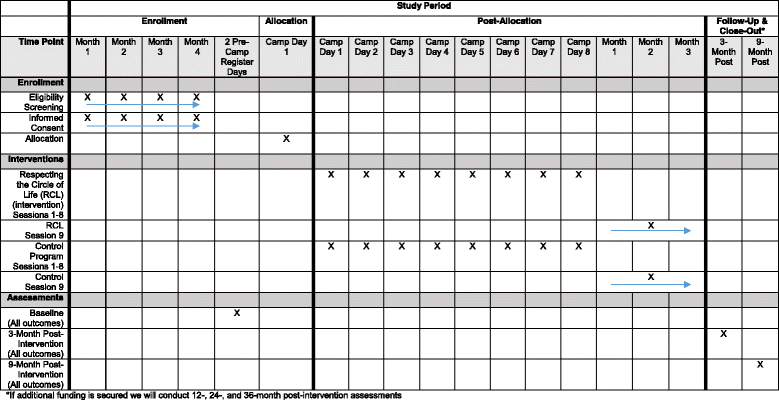Rigorous evaluation of a pregnancy prevention program for American Indian youth and adolescents: study protocol for a randomized controlled trial
- PMID: 28241775
- PMCID: PMC5330144
- DOI: 10.1186/s13063-017-1842-6
Rigorous evaluation of a pregnancy prevention program for American Indian youth and adolescents: study protocol for a randomized controlled trial
Abstract
Background: American Indian adolescents have one of the highest rates of teen pregnancy and repeat teen births in the US. Substance use is a significant risk factor for unprotected sex, and American Indian adolescents have the highest substance use-related morbidity and mortality of any US racial group. Despite these disparities, there are no existing, evidence-based programs for pregnancy prevention that have been rigorously evaluated among American Indian teens.
Methods: The proposed study is a randomized controlled trial to test the efficacy of a comprehensive sexual and reproductive health program developed in partnership with an American Indian community. Participants will be American Indians ages 11-19 and their parent or trusted adult, randomized to receive the control condition or intervention called Respecting the Circle of Life: Mind, Body and Spirit. The intervention includes eight lessons delivered to self-selected peer groups during a summer basketball camp and one lesson delivered to the youth and parent/trusted adult together within 3 months after camp. All lessons are administered by trained community health workers from the participating American Indian community. Youth and parent/trusted adult participants will complete assessments at baseline, 3, 9, 12, 24 and 36 months post-intervention completion. The primary outcome variables are sexual/reproductive health knowledge, sexual initiation, condom use self-efficacy and intent to use a condom at next sex as changed from baseline to post-intervention between intervention and control participants. Selected primary outcomes are applicable to all study participants.
Discussion: Currently there are no sexual and reproductive health programs designed specifically for American Indian youth that have been rigorously evaluated and found to have an evidence base. Respecting the Circle of Life is highly innovative by incorporating lesson delivery into a summer basketball camp and involving parents or other trusted adults in curriculum administration. If found successful, it will be the first evidence-based program for teen pregnancy prevention for American Indian youth and adolescents.
Trial registration: Clinicaltrials.gov, NCT02904629 . Retrospectively registered on 23 September 2016.
Keywords: Adolescent; American Indian; HIV; Health behavior; Pregnancy and childbirth; Randomized controlled trials; Sexually transmitted infections.
Similar articles
-
Testing the efficacy of a brief sexual risk reduction intervention among high-risk American Indian adults: study protocol for a randomized controlled trial.BMC Public Health. 2016 Apr 29;16:366. doi: 10.1186/s12889-016-3040-y. BMC Public Health. 2016. PMID: 27129956 Free PMC article. Clinical Trial.
-
Respecting the circle of life: one year outcomes from a randomized controlled comparison of an HIV risk reduction intervention for American Indian adolescents.AIDS Care. 2015;27(9):1087-97. doi: 10.1080/09540121.2015.1028879. Epub 2015 Apr 2. AIDS Care. 2015. PMID: 25837379 Clinical Trial.
-
NATIVE-It's Your Game: Adapting a Technology-Based Sexual Health Curriculum for American Indian and Alaska Native youth.J Prim Prev. 2017 Apr;38(1-2):27-48. doi: 10.1007/s10935-016-0440-9. J Prim Prev. 2017. PMID: 27520459
-
Factors related to risky sexual behaviors and effective STI/HIV and pregnancy intervention programs for African American adolescents.Public Health Nurs. 2014 Sep-Oct;31(5):414-27. doi: 10.1111/phn.12128. Epub 2014 May 22. Public Health Nurs. 2014. PMID: 24850214 Review.
-
Assessing the Effectiveness of the Respecting the Circle of Life Project on Condom and Contraception Self-efficacy Among American Indian Youth.Prev Sci. 2023 Dec;24(Suppl 2):283-291. doi: 10.1007/s11121-023-01514-4. Epub 2023 May 25. Prev Sci. 2023. PMID: 37227589 Free PMC article. Review.
Cited by
-
The Development and Testing of a Multi-Level, Multi-Component Pilot Intervention To Reduce Sexual and Reproductive Health Disparities in a Tribal Community.J Ethn Cult Divers Soc Work. 2021;30(1):138-148. doi: 10.1080/15313204.2020.1770655. Epub 2020 Jun 5. J Ethn Cult Divers Soc Work. 2021. PMID: 33732097 Free PMC article. No abstract available.
-
Diné (Navajo) female perspectives on mother-daughter communication and cultural assets around the transition to womanhood: a cross-sectional survey.BMC Womens Health. 2021 Sep 25;21(1):341. doi: 10.1186/s12905-021-01473-4. BMC Womens Health. 2021. PMID: 34563201 Free PMC article.
-
Implementation Fidelity and Theory-Informed Dose Effects of a Teen Pregnancy Prevention Program for Native American Youth.Prev Sci. 2023 Dec;24(Suppl 2):229-240. doi: 10.1007/s11121-023-01501-9. Epub 2023 May 16. Prev Sci. 2023. PMID: 37191932 Free PMC article. Clinical Trial.
-
Healthy Native Youth: Improving Access to Effective, Culturally-Relevant Sexual Health Curricula.Front Public Health. 2018 Aug 17;6:225. doi: 10.3389/fpubh.2018.00225. eCollection 2018. Front Public Health. 2018. PMID: 30175091 Free PMC article.
-
Community Perceptions of Alcohol Exposed Pregnancy Prevention Program for American Indian and Alaska Native Teens.Int J Environ Res Public Health. 2019 May 21;16(10):1795. doi: 10.3390/ijerph16101795. Int J Environ Res Public Health. 2019. PMID: 31117177 Free PMC article.
References
-
- Division of Reproductive Health, National Center for Chronic Disease Prevention and Health Promotion . Birth Rates (Live Births) per 1,000 Females Aged 15–19 Years, by Race and Hispanic Ethnicity, Select Years. 2015.
-
- Martin JA, Hamilton BE, Ventura SJ, Osterman MJ, Wilson EC, Mathews TJ. Births: final data for 2010. Natl Vital Stat Rep. 2012;61:1–72. - PubMed
-
- Martin JA, Hamilton BE, Ventura SJ, Osterman MJ, Mathews TJ. Births: final data for 2011. Natl Vital Stat Rep. 2013;62:1–70. - PubMed
-
- Indian Health Service . Trends in Indian health, 2002–2003. Rockville (MD): IHS; 2009.
-
- Indian Health Service . Trends in Indian Health 1998–1999. Rockville (MD): IHS; 2001.
Publication types
MeSH terms
Associated data
LinkOut - more resources
Full Text Sources
Other Literature Sources
Medical


